SUMMARY
This is AI generated summarization, which may have errors. For context, always refer to the full article.
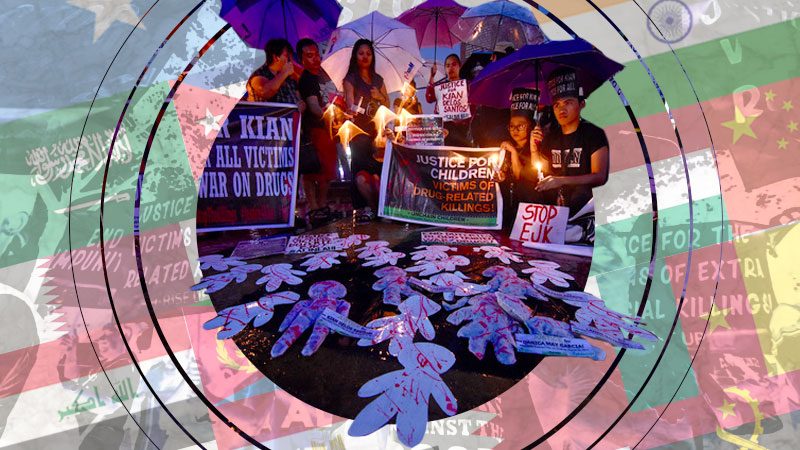
MANILA, Philippines – At least 14 countries, including the Philippines, voted against the Iceland-proposed resolution at the United Nations Human Rights Council (UNHRC), which called for action against the spate of killings in the Philippines.
Of these countries, 5 were just elected to the council in October 2018: Bahrain, Cameroon, the Philippines, Somalia, and Eritrea. Activists had criticized their election, saying they were “unqualified” because of their human rights records.
It’s no surprise that China, an ally of President Rodrigo Duterte, sided with the Philippines in the historic vote on Thursday, July 11, in which 18 countries adopted the Iceland resolution.
But aside from China, who are the Philippines’ new friends that voted against it?
Duterte had visited 5 of these countries as Chief Executive – China, India, Bahrain, Saudi Arabia, and Qatar – and personally met their leaders.
A check of these countries would show many governments widely criticized for human rights violations, crackdown on dissent, and the stifling of democracy. Some are helmed by leaders who bear similarities with Duterte.
Angola
Angola’s new leadership has been striving to change the image of the country tainted by the 4-decade strongman rule of Jose Eduardo dos Santos, which might have raised some hope that it would back the Iceland resolution.
Joao Lourenco was elected president in 2017, taking over from Dos Santos who, Amnesty International (AI) said, had plunged Angola into a “spiral of oppression” and left the country with an “appalling human rights record.”
Lourenco had sought to distance himself from his predecessor by launching a campaign against corruption that had netted several top officials of the previous government. He had also sought to mend fences with the international community long critical of Angola’s human rights record.
In a historic moment last year, Angola gave legal recognition to gay rights lobby group Iris Angola – a major breakthrough in a closed and conservative society. The Central African nation decriminalized homosexuality in January this year.
Bahrain
Human rights groups have criticized Bahrain for its human rights record. In March, Samah Hadid, AI’s Middle East director of campaigns, described the Gulf state “as a deeply repressive state where anyone critical of the government can be jailed merely for posting a tweet” and where “prominent human rights defenders are under relentless attack.”
In April, human rights groups slammed Bahrain after it jailed 138 people and revoked their citizenship for allegedly plotting to form a “terror” group with links to Iran’s Revolutionary Guards.
Cameroon
Cameroon has been wracked by civil strife over the past 3 years. In November 2018, Ravina Shamdasani, spokeswoman for the UN High Commissioner for Human Rights, said their office continued “to receive reports of abductions and killings by armed groups, as well as extrajudicial killings by State armed forces.”
Cameroon has been ruled since 1982 by President Paul Biya, who is also called “The Sphinx” as he is seen as a quiet autocrat. In 1986, he once warned of his sweeping powers, telling a Cameroonian journalist: “Just a little shake of my head and you’ll be reduced to nothing.”
Cuba
Cuba, a one-party communist state, has faced much criticism for its authoritarian nature, intolerance of opposition, and persecution of detractors.
In February this year, Cubans voted overwhelmingly in favor of constitutional reforms that would cement the role of socialism in the island nation.
Egypt
In 2018, AI reported that “the crackdown on freedom of expression under Egyptian President Abdel Fattah al-Sisi reached alarming new levels unparalleled in Egypt’s recent history.”
On Friday, July 12, Reuters reported that Egyptian authorities arrested the founder of a Facebook page with millions of followers that praises ousted President Hosni Mubarak.
Egypt had blocked hundreds of websites, among them, the Human Rights Watch website in 2017 after it released a report on alleged torture by security services. Other blocked websites include some belonging to media outlets and civil society groups.
In March this year, Egypt’s foreign media body slammed the BBC over an “insulting” article which highlighted online calls for protests against Sisi.
Eritrea
Eritrean President Isaias Afwerki has been in power since 1991. In 2016, the UN Commission of Inquiry (COI) on human rights said Afwerki’s government was guilty of committing crimes against humanity and should face international justice.
AI has also accused Eritrea of persecuting its exiled human rights activists though harassment and intimidation.
Hungary
In May, Council of Europe’s commissioner for human rights Dunja Mijatović accused Hungary’s government of violating people’s rights and using anti-migrant rhetoric that fuels “xenophobic attitudes, fear and hatred.”
Mijatović also cited Hungarian laws that “stigmatize and criminalize” the work of non-governmental organizations (NGOs).
Hungary’s leader, Prime Minister Viktor Orban has “created a repressive and increasingly authoritarian state, operating under a pretense of democracy” since coming to power in 2010, according to John Shattuck, Professor of Practice in Diplomacy at Tufts University. “In his 2010 campaign Orban fanned the flames of Hungarian discontent by attacking outsiders as oppressors, skillfully playing to Hungarians’ grievances about their history,” Shattuck wrote in The Conversation.
India
Prime Minister Narendra Modi is considered as one of the strongest and most popular Indian leaders in decades, and commands a loyal following.
Journalists who have written exposés about Modi’s government have been threatened by his supporters.
In 2018, AI launched a petition – “tell the Indian Prime Minister to stop attacking activists and organizations including Amnesty India and Greenpeace India” – after it was reported that “Indian authorities raided both Amnesty India and Greenpeace India’s offices and froze their bank accounts.”
“And this is just the tip of the iceberg. Many other organizations and individuals are being targeted using the repressive Foreign Contribution (Regulation) Act. Last year, 10 prominent human rights activists were arrested under a draconian security law. These actions are politically motivated – and a sign that the government is afraid of being exposed,” AI added.
Iraq
Human Rights Watch said in a 2018 report that Iraqi forces committed human rights abuses “under the guise of fighting terror.”
“Under the guise of fighting terror, Iraqi forces arbitrarily detained, ill-treated and tortured, and disappeared mostly Sunni men from areas where ISIS was active and failed to respect their due process and fair trial rights,” HRW said.
“Iraqi authorities imposed security measures against individuals and families perceived as having relatives who supported ISIS in the past in what amounted to collective punishment. Other human rights violations persisted, including violations of freedom of assembly and expression, women’s rights, and the continued use of the death penalty,” it added.
Qatar
Qatar is home to an estimated 260,000 Filipinos, as of 2017. In May, United Nations member-states urged Qatar to reform its policy on domestic workers’ rights, and also to ban capital punishment.
In September 2018, AI released a highly critical report on Qatar, alleging that migrant workers building infrastructure for a new city that will host 2022 World Cup matches suffered exploitation and human rights violations despite promised government reforms.
Saudi Arabia
The killing of journalist Jamal Khashoggi inside the Saudi consulate in Istanbul last year magnified the state of press freedom in the kingdom. In March, it rejected calls for an international, independent investigation into the murder of Khassoggi, a critic of Crown Prince Mohammed bin Salman.
Somalia
Somalia’s election into the UNHRC was criticized as its human rights record include, among others, the killing of civilians by security forces, disappearances, torture, lack of free and fair elections, and restrictions on free speech, free press, and freedom of association.
In January 2019, the Somalian government ordered Nicholas Haysom, the UN top envoy to the country, to leave the country, accusing him of “deliberately interfering with the country’s sovereignty.”
Haysom had raised concerns over the action of Somalia’s UN-backed security services in violence that left several people dead. – With reports from Agence France-Presse/Rappler.com
Add a comment
How does this make you feel?
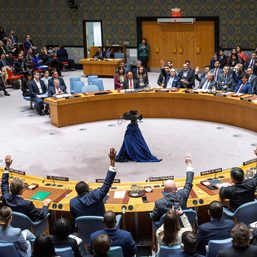
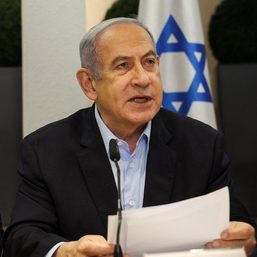
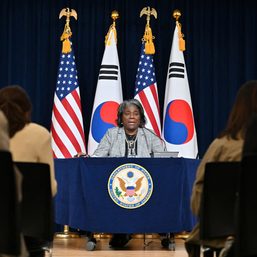

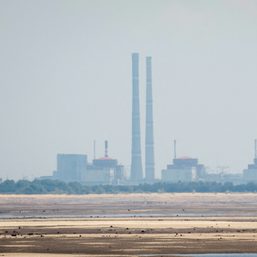
There are no comments yet. Add your comment to start the conversation.